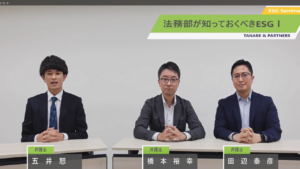
A conversation between several lawyers at Tanabe & Partners (T&P) on the topic —
Goi:
In this discussion, I would like to look at ESG international voluntary disclosure standards that legal departments should be aware of. Since hundreds of standards are gradually converging, why don’t we focus on two standards, GRI and ISSB. First, should legal departments keep up with ESG disclosure standards? Some people seem to think that the corporate department, committee or task force charged with sustainability should know about such standards, and that the legal department should leave things up to them. What do you think about this?
Hashimoto:
ESG has become an integral part of corporate strategy and risk management. The legal department is expected to fulfill its role in both promoting strategy and improving risk management, so it cannot afford to be ignorant of the basics of ESG disclosure standards. International disclosure standards are gradually being woven into regulatory disclosure. For starters, Japanese companies are required to include a statement of “sustainability-related views and initiatives” in their Yuho.
When you are asked to review a contract from a legal perspective, what do you rely on? You can only review the contract, if you know the Civil Code, the Companies Act, etc. Legal is asked to review because Legal is able to foresee what will happen if the contract is breached, what will happen if the law is violated, etc. It is difficult to conduct an effective review of ESG disclosure without knowing the system and the concept of ESG disclosure standards.
